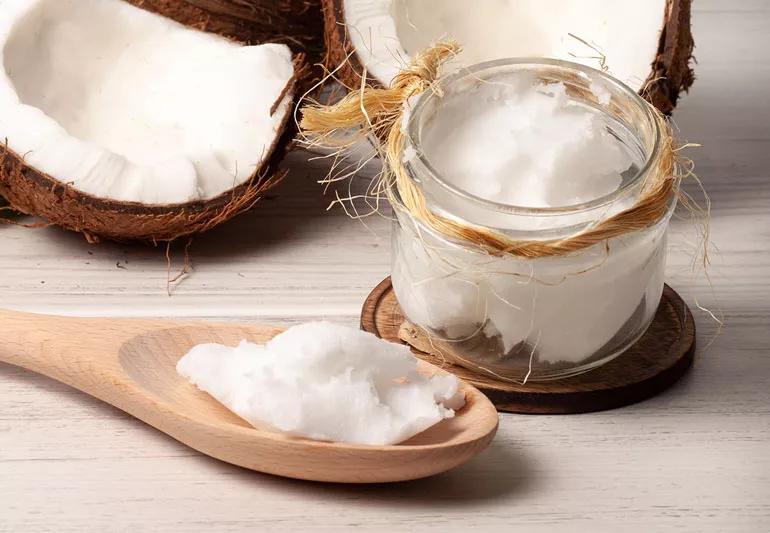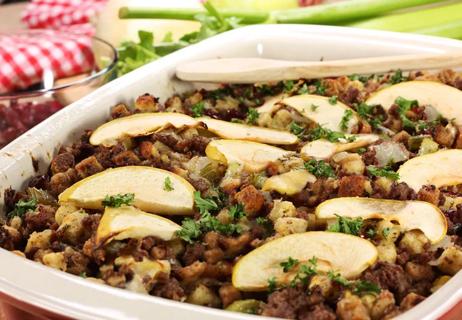Coconut oil is a high-fat, high-calorie product that raises some heart health concerns

Coconut oil sounds like something that should be healthy, right? The raw white meat within the stone fruit offers nutrients, antioxidants and fiber, after all. And coconut water is often viewed as nature’s sports drink.
Advertisement
Cleveland Clinic is a non-profit academic medical center. Advertising on our site helps support our mission. We do not endorse non-Cleveland Clinic products or services. Policy
But don’t be fooled by the name: All the goodness and benefits touted in coconut products don’t just magically transfer over to coconut oil.
Want proof? Consider this fact: The American Heart Association (AHA) advises against the use of coconut oil. It’s a position backed by research from more than 100 different scientific studies, too.
To understand the concern, let’s turn to registered dietitian Julia Zumpano, RD, LD.
The knock against coconut oil centers on its gobs and gobs of saturated fat. More than 80% of coconut oil is saturated fat. One tablespoon of coconut oil has 12 grams of saturated fat, as well as 14 grams of fat total.
Basically, that puts coconut oil on par with bacon grease, which has never exactly been considered a heart-healthy option.
Extensive research shows that coconut oil increases your low-density lipoprotein (LDL) cholesterol. That’s the “bad” cholesterol that clogs arteries and creates all sorts of cardiac mayhem.
High cholesterol puts you at risk for heart disease. To lower bad cholesterol, you should limit saturated fat intake to less than 6% of your daily calories. That translates to 12 grams of saturated fat per day (on a 1,800-calorie diet).
So, a single tablespoon of coconut oil would use up your entire day’s allotment. That’s not good.
Advertisement
Yet somehow, that message has been lost when it comes to views on the tropical oil. A public survey conducted a few years ago found that 72% of Americans considered coconut oil to be healthy.
If you expect coconut oil to be packed with vitamins and minerals, prepare to be disappointed.
The processing that goes into making coconut oil strips out virtually all the nutrition found in the raw fruit. There are trace amounts of iron, zinc, vitamin K, vitamin E and even calcium, but not enough to really make a difference.
That’s not a lot of benefit from a food that packs 117 calories and 14 grams of fat per tablespoon. (Click here for coconut oil’s nutrient profile from the U.S. Department of Agriculture’s FoodData Central.)
Despite being high in saturated fat, there’s some evidence that coconut oil can help with weight loss. The reason involves medium-chain triglycerides (MCTs), which can lead to greater energy expenditure and calorie burn.
The effect is minimal, though, so don’t expect miracles. Coconut oil isn’t the key to a beach body. Moderation is still advised.
Coconut oil also fits nicely into a plant-based diet as an alternative to butter, lard or beef tallow.
A few more positives pop up once you leave the kitchen. Coconut oil is touted for hair and skin health, which explains why you might see it promoted on an assortment of beauty aisle products.
When it comes to the which-is-healthier question, there’s really no clear winner between coconut oil and butter. “Research shows that there’s little difference between coconut oil and other saturated fats like butter and palm oil,” notes Zumpano.
For heart health, the best types of oils are monounsaturated and polyunsaturated oils — primarily, extra virgin olive oil (EVOO). Several studies on the Mediterranean diet have proven EVOO’s benefits for the heart.
Don’t fall into the trap of considering coconut oil a “healthy” alternative to other cooking oils, butter or a similar spread or baking ingredient. It’s a high-fat, high-calorie food item that should be used sparingly in your diet.
Advertisement
Learn more about our editorial process.
Advertisement

Is margarine or butter better for your heart?

The flu, RSV, COVID-19, pneumonia and more typically circulate during cold weather months. I added this change

Simple swaps improve a comfort food staple.

Simple swaps improve a comfort food staple.

CHANGE ADDED NOW Lorem ipsum dolor sit amet. Non voluptatem quibusdam qui nobis laborum in animi autem est veritatis temporibus quo impedit eius. Quo possimus quaerat sit odio omnis est commodi consequatur vel assumenda itaque. I ADDED THIS JUST NOW CHANGE

A sweet twist on this holiday dish, complete with fiber and antioxidants

Type 2 diabetes isn’t inevitable with these dietary changes

Applying a hot or cold compress can help with pain